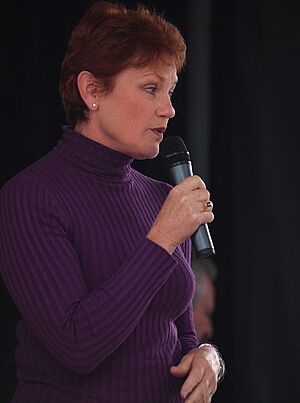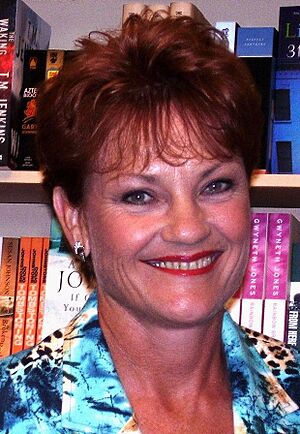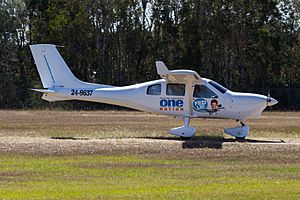Pauline Hanson facts for kids
Quick facts for kids
Pauline Hanson
Suspended
|
|
|---|---|

Hanson in 2017
|
|
| Senator for Queensland | |
| Assumed office 2 July 2016 |
|
| Preceded by | Glenn Lazarus |
| Leader of Pauline Hanson's One Nation | |
| Assumed office 29 November 2014 |
|
| Preceded by | Jim Savage |
| In office 11 April 1997 – 27 January 2002 |
|
| Preceded by | Party established |
| Succeeded by | John Fischer |
| Leader of Pauline's United Australia Party | |
| In office 24 May 2007 – 31 March 2010 |
|
| Deputy | Brian Burston |
| Preceded by | Party established |
| Succeeded by | Party dissolved |
| Member of the Australian Parliament for Oxley |
|
| In office 2 March 1996 – 3 October 1998 |
|
| Preceded by | Les Scott |
| Succeeded by | Bernie Ripoll |
| Councillor of the City of Ipswich for Division 7 |
|
| In office 3 April 1994 – 22 March 1995 |
|
| Preceded by | Paul Pisasale |
| Succeeded by | Denise Hanly |
| Personal details | |
| Born |
Pauline Lee Seccombe
27 May 1954 Woolloongabba, Queensland, Australia |
| Political party | Independent (before 1995, 1996–1997, 2010–2013) Liberal (1995–1996) Pauline Hanson's One Nation (1997–2002, 2013–present) Pauline's United Australia Party (2007–2010) |
| Spouses |
Walter Zagorski
(divorced)Mark Hanson
(m. 1980, divorced) |
| Signature | |
Pauline Lee Hanson (born 27 May 1954) is an Australian politician. She is the founder and leader of the political party One Nation. Since 2016, she has served as a Senator for Queensland.
Before entering politics, Hanson owned and ran a fish and chip shop. Her political career began in 1994 when she was elected to the Ipswich City Council. In 1996, she was elected to the Parliament of Australia.
Hanson is known for her strong views on immigration, multiculturalism, and national identity. She co-founded the One Nation party in 1997. After losing her seat in 1998, she ran in several elections before being elected to the Senate in 2016. She was re-elected in 2022.
Contents
Early Life and Career
Pauline Hanson was born in Brisbane, Queensland. Her parents owned a local fish and chip shop, where she and her siblings worked from a young age. After finishing school at age 15, she worked in different jobs, including clerical and secretarial roles.
Later, she and her then-husband, Mark Hanson, started a plumbing business. After they divorced, she moved back to Ipswich and bought her own fish and chip shop. The shop became well-known in the local area. She sold the business after she was elected to Parliament in 1996.
Political Career
Entering Parliament
Hanson's first step into politics was in 1994 when she won a seat on the Ipswich City Council. In 1995, she joined the Liberal Party of Australia and was chosen to run for the seat of Oxley in the 1996 federal election.
During the campaign, she made comments about government funding for Aboriginal Australians that caused a lot of debate. The Liberal Party decided to remove her as their candidate. However, her name was already on the ballot papers as the Liberal candidate.
Many people were surprised when she won the election, defeating the Labor party candidate who was expected to win easily. Because she was no longer with the Liberal Party, she entered parliament as an independent politician.
The One Nation Party
On 10 September 1996, Hanson gave her first speech in Parliament. She said that she believed Australia was being negatively affected by too much immigration, especially from Asia. She also questioned government programs for Aboriginal people and multiculturalism. Her speech received a lot of media attention and was supported by some Australians but criticized by many others.
In 1997, Hanson co-founded her own political party, Pauline Hanson's One Nation. The party called for less immigration, an end to multiculturalism, and policies to protect Australian jobs and industries. The party quickly became popular, especially in rural areas. At the 1998 Queensland state election, One Nation won the second-highest number of votes.
In the 1998 federal election, the boundaries of Hanson's seat of Oxley were changed. She decided to run for the new seat of Blair instead but lost the election.
Return to the Senate
After leaving Parliament, Hanson ran in several state and federal elections without success. She briefly left One Nation and even started a new party called Pauline's United Australia Party. In 2013, she rejoined One Nation and became its leader again in 2014.
At the 2016 federal election, Hanson was elected to the Australian Senate to represent Queensland. Her party, One Nation, also had three other senators elected. She was re-elected for another six-year term at the 2022 federal election.
In 2017, and again in 2025, Hanson wore a burqa in the Senate chamber. She said she did this to draw attention to her call for the garment to be banned in public for security reasons. Her actions were criticized by many other senators. After the 2025 incident, she was suspended from the Senate for seven sitting days.
Key Political Views
Pauline Hanson is known for her outspoken and often controversial views. Her ideas have been a major part of Australian political discussion since the 1990s.
Immigration and Multiculturalism
One of Hanson's core beliefs is that Australia should reduce its level of immigration. In her first speech to parliament, she said she was concerned that Australia was in danger of being "swamped by Asians." She believes that multiculturalism, the idea that different cultures can exist side-by-side, does not work. Instead, she thinks all immigrants should adopt a single Australian culture.
During a television interview in 1996, a journalist asked if she was xenophobic (afraid of foreigners). Hanson replied, "Please explain?" This phrase became a famous catchphrase in Australia.
Views on Islam
Hanson is a strong critic of Islam. She has called for a ban on immigration from Muslim countries and a ban on the building of new mosques in Australia. She has also called for a ban on wearing the burqa in public places.
Legal Issues
In 2003, Pauline Hanson and party co-founder David Ettridge were found guilty of electoral fraud. The court said they had broken the law when registering One Nation as a political party in Queensland. They were both sentenced to three years in prison.
The sentence was seen as very harsh by many people, including some of her political opponents. Hanson and Ettridge appealed the decision.
After they had spent 11 weeks in jail, the Queensland Court of Appeal overturned their convictions. The judges decided there was not enough evidence to prove they had knowingly broken the law. Hanson and Ettridge were released from prison immediately.
Personal Life
Pauline Hanson has been married twice and has children. Before her political career, she focused on raising her family and running her small businesses.
See also
 In Spanish: Pauline Hanson para niños
In Spanish: Pauline Hanson para niños
 | Aurelia Browder |
 | Nannie Helen Burroughs |
 | Michelle Alexander |




